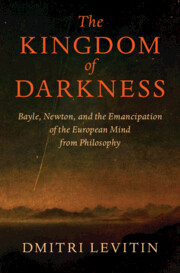The Kingdom of Darkness
In 1500, speculative philosophy lay at the heart of European intellectual life; by 1700, its role was drastically diminished. The Kingdom of Darkness tells the story of this momentous transformation. Dmitri Levitin explores the structural factors behind this change: the emancipation of natural philosophy from metaphysics; theologians' growing preference for philology over philosophy; and a new conception of the limits of the human mind derived from historical and oriental scholarship, not least concerning China and Japan. In turn, he shows that the ideas of two of Europe's most famous thinkers, Pierre Bayle and Isaac Newton, were both the products of this transformation and catalysts for its success. Drawing on hundreds of sources in many languages, Levitin traces in unprecedented detail Bayle and Newton's conceptions of what Thomas Hobbes called The Kingdom of Darkness: a genealogical vision of how philosophy had corrupted the human mind. Both men sought to remedy this corruption, and their ideas helped lay the foundation for the system of knowledge that emerged in the eighteenth century.
- Proposes a new, large-scale explanation of early modern intellectual change
- Offers brand new, in-depth interpretations of the thought of two of Europe's leading thinkers, Pierre Bayle and Isaac Newton
- Combines approaches from the history of philosophy, science, medicine, scholarship, Orientalism, theology, and political thought
Reviews & endorsements
'This truly monumental study calls for a Copernican revolution in our understanding of Modernity: the European Mind, Levitin argues, was not transformed by the triumph of philosophy but by emancipation from it. The evidence and acumen with which Levitin advances his bold thesis are extraordinary and will provoke debate for years to come.' Maria Rosa Antognazza, King's College London
'In his extraordinarily erudite and broad-ranging study, Levitin compels us to rethink historiographic categories such as the Scientific Revolution, the Enlightenment and the rise of modernity in Europe by charting the contingent historical conditions that prompted a momentous, yet overlooked, disciplinary reconfiguration of early-modern natural philosophy and theology; namely, the emancipation of both scientific and religious thought from traditional metaphysics and philosophical rationalism.' Niccolò Guicciardini, Università degli Studi di Milano
'This is one of the most important publications in European intellectual history, not just of this year, but of the last decade.' Noel Malcolm, Books of the Year 2022, Times Literary Supplement
'… Levitin makes a powerful case for the need to reconceptualize understanding of the Enlightenment and its subsequent history and influence on modern thought. The book is a paradigm of academic scholarship. The author's research and presentation are comprehensive and extensive … Essential.' D. B. Boersema, Choice
'… a remarkably erudite and important study with a highly intricate argument that requires slow and careful reading if one is fully to grasp its insights and nuances.' Daniel Woolf, Marginalia Review of Books
Product details
March 2022Adobe eBook Reader
9781108945493
0 pages
This ISBN is for an eBook version which is distributed on our behalf by a third party.
Table of Contents
- Preface
- Abbreviations and Conventions
- Part I. Giving Up Philosophy: The Transformation of a System of Knowledge:
- 1. Giving Up Philosophy
- 1.1. The Emancipation of Natural Philosophy from Metaphysics
- 1.2. The Emancipation of Theology from Philosophy
- 1.3. Reconstructing the Pagan Mind in Seventeenth-century Europe: A Historico-philosophical Critique of Pure Reason
- Part II. Pierre Bayle and The Emancipation of Religion from Philosophy:
- 2. Pierre Bayle: A Life in the Republic of Letters
- 2.1. Greece, Asia, and the Logic of Paganism. Cartesian Occasionalism as the only 'Christian Philosophy'
- 2.2. The Manichean Articles and the 'Sponge of All Religions'
- 2.3. Theological Method and the Foundations of Protestant Faith
- 2.4. Virtuous Atheism, Philosophic Sin, and Toleration
- Part III. Isaac Newton and the Emancipation of Natural Philosophy from Metaphysics:
- 3. The Formation of Newton's Natural Philosophical Project, 1664–1687
- 3.1. After the Principia. Justifying a Science of Properties and the Invention of 'Newtonianism'
- 3.2. The Queries to the Optice (1706). An Intelligent God, the Divine Sensorium, and the Development of an Anti-metaphysical Natural Theology
- 3.3. The General Scholium: A Non-metaphysical Physics
- 3.4. Newton's Kingdom of Darkness Complete
- Part IV. Conclusion: The European System of Knowledge, 1700 and Beyond: Conclusion
- Bibliography.






.jpg)
